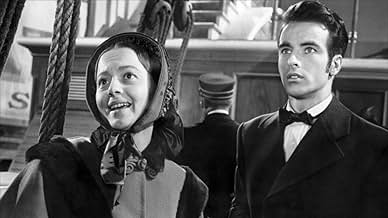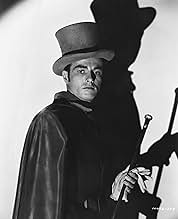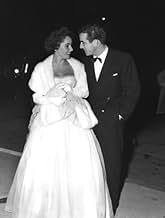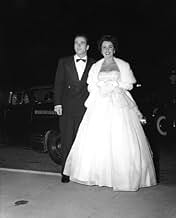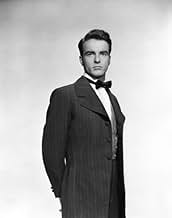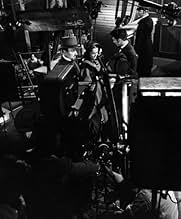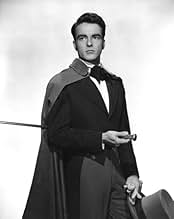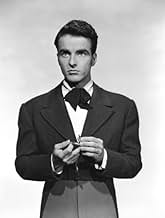Une jeune femme naïve tombe en amour avec un beau jeune homme que son père émotionnellement violent soupçonne d'être un chasseur de fortune.Une jeune femme naïve tombe en amour avec un beau jeune homme que son père émotionnellement violent soupçonne d'être un chasseur de fortune.Une jeune femme naïve tombe en amour avec un beau jeune homme que son père émotionnellement violent soupçonne d'être un chasseur de fortune.
- A remporté 4 oscars
- 9 victoires et 8 nominations au total
Mary Bayless
- Party Guest
- (uncredited)
Nan Boardman
- French Maid
- (uncredited)
Jack Chefe
- French Waiter
- (uncredited)
Marcel De la Brosse
- French Porter
- (uncredited)
Ray De Ravenne
- French Waiter
- (uncredited)
Histoire
Le saviez-vous
- AnecdotesDirector William Wyler shot 37 takes of Olivia de Havilland carrying her suitcases up the stairs. Only after the final shoot, whereupon she briefly stopped on the second flight of stairs and leaned on the handrail for a couple of seconds, did Wyler declare that this was the take he wanted to print.
- GaffesThis story takes place at the end of the 1840s, but none of the men wear the cravats--material bound around the neck and tied in either the front or back--that were fashionable in that period; instead they wear neckties and bow ties, which did not come into fashion until the late 1850s.
- Citations
Aunt Penniman: Can you be so cruel?
Catherine Sloper: Yes, I can be very cruel. I have been taught by masters.
- ConnexionsFeatured in AFI Life Achievement Award: A Tribute to William Wyler (1976)
Commentaire en vedette
To call this film well-acted is like calling "Citizen Kane" a nice movie and Alfred Hitchcock an "okay" director. William Wyler was known for eliciting excellent performances from his actors (he's responsible for them receiving a record 14 Oscars in acting; more than twice as many as any other director) and in "The Heiress" he's in top form. This movie should be played in every acting class ever taught to show the brilliance of subtlety and range of expressions possible when one is conveying a character's inner emotions.
Olivia De Havilland is a beautiful woman, but you believe she's an ungainly bundle of shy awkwardness in the role of Catherine Sloper. And her transformation to a cruel wounded creature is perfectly believable. And Ralph Richardson as Dr. Sloper and Miriam Hopkins as Aunt Lavinia are letter perfect beside her. Sir Ralph (at least, I THINK he was knighted) can do more with stillness and a flick of an eyebrow than any actor I've ever seen (including Brando, Penn and any other method actor you care to toss into the mix). He was robbed at the Oscars.
Montgomery Clift was beautiful and seductive and, except for a couple of moments where he seemed too 1950s instead of 1850s, just right for the part. He almost holds his own with Sir Ralph when they meet to discuss him marrying Catherine, but he did do better work in "A Place In The Sun" and "From Here To Eternity."
Wyler's simplicity and grace in directing only enhanced the story. The use of mirrors to deepen emotional content (as in when Dr. Sloper, now ill, goes to his office after getting the cold shoulder from Catherine) is stunning. So is his willingness to let a scene play out rather than force along the pacing of the moment, as so many directors do, today (as in when Catherine offers to help her father rewrite his will).
There are no easy answers in this movie. You can think Dr. Sloper is right about Morris and only wants to protect his daughter, or you can see his actions as those of a vindictive man who blames her for the death of his beloved wife (in childbirth). Morris could be a fortune hunter, or he could be a man who does care for Catherine, in his own way, and would make her happy. Or all of the above. The whole movie is so beautifully composed, it's breathtaking. A definite must see for anyone who appreciates great stories well-told.
Olivia De Havilland is a beautiful woman, but you believe she's an ungainly bundle of shy awkwardness in the role of Catherine Sloper. And her transformation to a cruel wounded creature is perfectly believable. And Ralph Richardson as Dr. Sloper and Miriam Hopkins as Aunt Lavinia are letter perfect beside her. Sir Ralph (at least, I THINK he was knighted) can do more with stillness and a flick of an eyebrow than any actor I've ever seen (including Brando, Penn and any other method actor you care to toss into the mix). He was robbed at the Oscars.
Montgomery Clift was beautiful and seductive and, except for a couple of moments where he seemed too 1950s instead of 1850s, just right for the part. He almost holds his own with Sir Ralph when they meet to discuss him marrying Catherine, but he did do better work in "A Place In The Sun" and "From Here To Eternity."
Wyler's simplicity and grace in directing only enhanced the story. The use of mirrors to deepen emotional content (as in when Dr. Sloper, now ill, goes to his office after getting the cold shoulder from Catherine) is stunning. So is his willingness to let a scene play out rather than force along the pacing of the moment, as so many directors do, today (as in when Catherine offers to help her father rewrite his will).
There are no easy answers in this movie. You can think Dr. Sloper is right about Morris and only wants to protect his daughter, or you can see his actions as those of a vindictive man who blames her for the death of his beloved wife (in childbirth). Morris could be a fortune hunter, or he could be a man who does care for Catherine, in his own way, and would make her happy. Or all of the above. The whole movie is so beautifully composed, it's breathtaking. A definite must see for anyone who appreciates great stories well-told.
- jemmytee
- 8 avr. 2004
- Lien permanent
Meilleurs choix
Connectez-vous pour évaluer et surveiller les recommandations personnalisées
Détails
Box-office
- Budget
- 2 600 000 $ US (estimation)
- Brut – à l'échelle mondiale
- 158 $ US
- Durée1 heure 55 minutes
- Couleur
- Rapport de forme
- 1.37 : 1
Contribuer à cette page
Suggérer une modification ou ajouter du contenu manquant

Lacune principale
By what name was The Heiress (1949) officially released in India in English?
Répondre

